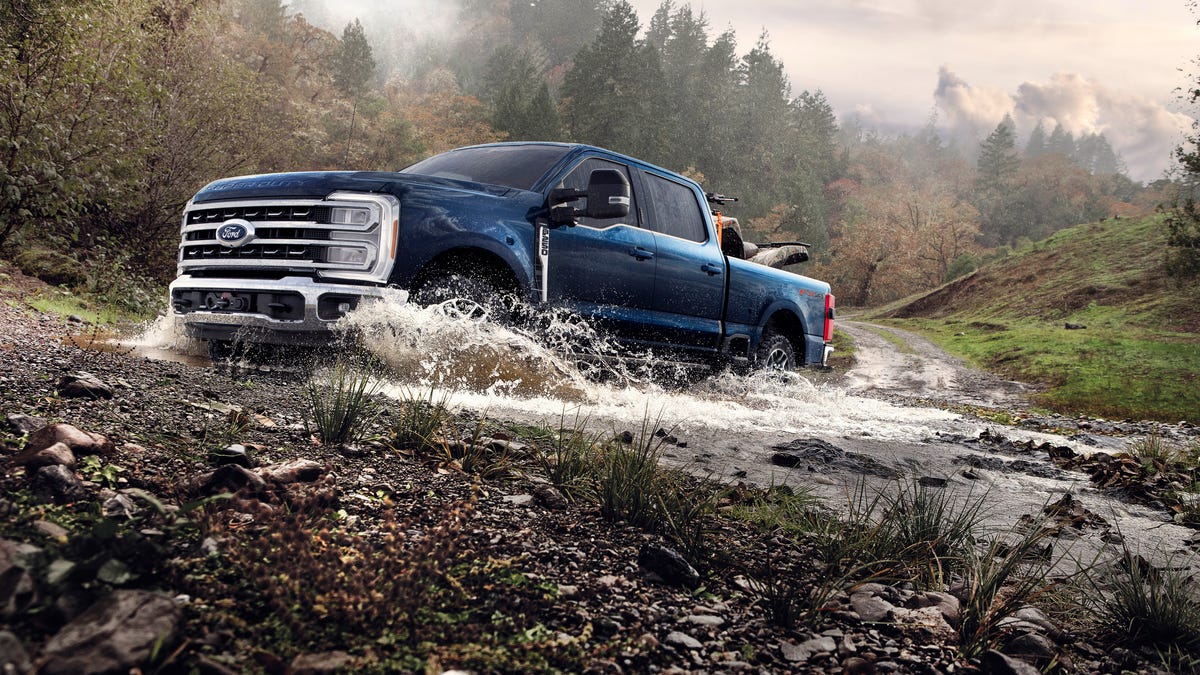Ford Motor Co. in Canada. The plant will produce F-Series Super Duty trucks starting in 2026, and the Dearborn automaker will shift production of the all-electric three-row SUV to another unspecified plant after delaying the project there.
Ford is investing $3 billion to add initial annual capacity for 100,000 F-Series super-duty trucks at its Oakville Assembly Complex in Ontario outside Toronto and ended production of the Ford Edge crossover in May.
The expansion, which will retain 1,800 jobs at the plant, is a response to demand from the automaker’s profit engine, the Ford Pro commercial business. Super Duty production at the Kentucky Truck Assembly Plant and Ohio Assembly Plant is running at full capacity with 200,000 vehicles produced in the first half of the year, the company said. The F-Series, which includes the light-duty F-150, is the country’s best-selling nameplate.
“SuperDuty is an important tool for businesses and people around the world, and even with our Kentucky truck plant and Ohio assembly plant running smoothly, we cannot keep up with demand. “This move benefits our customers and supercharges our Ford Pro commercial business,” Ford CEO Jim Farley said in a statement. 2 We look forward to leveraging our learnings as an electric vehicle brand to deliver fantastic, profitable vehicles.”
Ford is the only company of the Detroit Three that manufactures all of its full-size trucks in the United States. The United Auto Workers decided last fall to go on strike at Kentucky Truck, its most profitable plant that produces superduties and full-size SUVs. Following that, Farley said earlier this year that Ford “needs to think carefully about our (production) footprint.”
However, the expansion to Oakville would allow for a staggered model-year transition, spokeswoman Jessica Enoch said. That means super duty production won’t stop completely from retooling on a Kentucky truck. Ohio Assembly builds a special chassis cab version of the Super Duty. Oakville can manufacture pickup and chassis wagon models.
If demand slows, U.S. plants will prioritize production, Enoch said. The UAW’s deal with Ford calls for a $750 million investment in Kentucky Truck, including continued Super Duty production and new hybrid versions of the Ford Expedition and Lincoln Navigator SUVs.
Government infrastructure investments, roll-out of 5G telecom systems and promotion of domestic manufacturing are driving Ford Pro sales.
“There is sustained demand for Super Duty from Ford Pro customers because of the high cost of infrastructure and related construction activities,” Ford Pro CEO Ted Cannis said in a statement. “Many retail customers were unable to receive their trucks quickly due to our production constraints.”
The Ford Pro gained 16.7% in the first quarter. Having more Ford Pro vehicles on the road could lead the company to expand its software services and telematics business, which offer higher margins than vehicles, said Sam Abulzamid, principal e-mobility analyst at market research firm Kitehouse Inc.
Super-duty pickups have dominated the market for the past two decades, said Sam Piorani, vice president of global vehicle forecasting at AutoForecast Solutions LLC.
“It’s a good product to bring that plant back to life,” he said. “Giving Ford a little more profitable and in-demand trucks will help their bottom line as the company transitions to EVs.”
That means building more vehicles that produce high levels of greenhouse gas emissions will help finance the path to vehicles with zero tailpipe emissions. U.S. fuel economy and emissions regulations allow automakers to tailor their product mix to meet the standards regardless of technology, and the rules finalized under the Biden administration include more flexible targets than initially proposed.
A Trump administration could further roll back those regulations. The U.S. Supreme Court’s ruling last month to strike down the Chevron doctrine curtails the power of federal agencies to interpret statutes and call regulations into question, Abulzamid said.
“They’re going to do it anyway,” he said of the expansion of Super Duty production. “They looked at their business needs and they needed to build these trucks. That plant (Oakville) was available. It just made sense.”
Details on what electrified powertrains will be available on the next-gen Super Duty haven’t been shared, but the lineup will include some sort of hybrid option and possibly an extended electric vehicle model with an on-board generator. The researchers said. Ford executives have discussed their interest in that technology in recent appearances.
Investments for Oakville include $2.3 billion to establish assembly and integrated stamping operations. That would protect roughly 1,800 jobs in Oakville, 400 more than were initially needed to produce the three-row electric SUV. It will also add about 150 jobs at the Windsor Engine Complex to produce V-8 engines.
It will add about 70 jobs and additional overtime at U.S. parts plants. The Sharonville, Ohio, transmission plant will cost $24 million and include additional overtime. The Rawsonville Components Plant in Michigan will receive $1 million and about 20 new jobs. The Sterling Axle plant in Michigan will add about 50 new jobs.
Ford’s Chief Operating Officer Kumar Kalhotra said in a statement, “This investment will benefit Ford, our employees in Canada and the US, and especially our customers who need and need Super Duty for their lives and livelihoods. “It is fully aligned with our Ford+ plan for profitable growth, our global manufacturing footprint. As we move to scale up, our investments will pay back quickly.”
Workers represented by the Canadian union Unifor in Oakville will return a year earlier than expected due to delays in the three-row SUV project. Ford said in April that it would delay the launch of the vehicle from 2025 to 2027, anticipating better battery technology and growth in EV sales that have slowed over the past year or so.
“This new retooling plan for the Oakville plant addresses our union’s concerns that Ford Motor Company’s delay in new vehicle production would be too long, too disruptive and unacceptably harmful,” Unifor National President Lana Payne said in a statement. “Together with our local unions and company executives, we have come to an agreement that will not only get our members back to work as soon as possible, but also protect our members’ jobs in the future.”
It is not clear where the three-row SUV will be built or if it will be launched in 2027. Analysts suggested that there are many places where Ford could develop the vehicle. The battery plant and new EV assembly plant at the new $5.6 billion BlueOval City campus in Staunton, Tennessee are expected to begin deliveries of the next-generation F-Series truck in 2026.
That platform could be an option, or the SUV could replace the F-150 Lightning produced at the Dearborn Electric Vehicle Center. However, Ford’s UAW contract represents a new EV truck for the base as part of a $900 million investment with the Dearborn truck assembly plant.
Abulsamid noted that the original plan was to build the all-electric SUV on the same site as the Mustang Mach-E SUV in Mexico’s Guatitlan Iscali. Another option could be the Louisville Assembly Plant in Kentucky, which makes the Ford Escape and Lincoln Corsair SUVs, Fiorani said. The UAW contract already calls for a $1.2 billion investment and a new EV product.
Although Ford reported US EV sales up 72% in the first half of 2024 and hybrids up 50% year-over-year, it expects to lose at least $5 billion in its Model e EV segment this year. The changes to planned production of the three-row electric SUV are part of $12 billion in planned EV investment cuts and delays the company has already disclosed.
Ford executives touted the work being done by a small “skunkworks” team in California to build an all-electric platform that could support profitable but affordable EVs with starting prices of $25,000 to $30,000.
The delay and shift in that SUV niche acknowledges a longer-than-anticipated transition to EVs in the industry, Fiorani said: “Buyers aren’t going to line up to spend $70,000 on a new electric vehicle. These buyers want. Reasonably priced vehicles and the convenience of familiarity with the product will bring them in.” Keeps in combustion engine vehicles and hybrids.”
@BreanaCNoble


